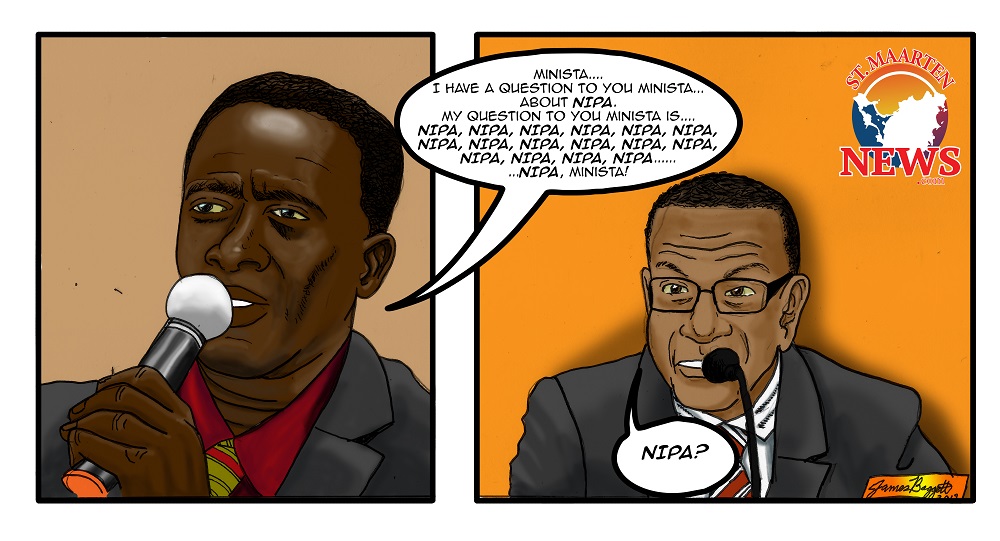The Daily Invisible

By Hilbert Haar
Julius Vischjager was, I am not exaggerating, a phenomenon. Between 1977 and 2009 he produced 528 editions of The Daily Invisible, the only handwritten newspaper in the world. Vischjager was its editor-in-chief who provided all of its contents.
Did this make Vischjager a journalist? A publisher? The fact is that he had access to the weekly press conferences of Dutch prime ministers. And he had a privilege: he was always given the opportunity to pose the last question. Dismissing Vischjager as the village idiot would be a mistake. His creativity alone set him apart from any crowd. In 1988 the respected broadsheet NRC Handelsblad recognized this by publishing a special edition of The Daily Invisible.
The fact that Vischjager could do what he did, and that he could attend press conferences of Dutch prime ministers without any problem shows how the authorities on the other side of the ocean treat the fourth estate.
The government in Curacao has chosen, and not for the first time, for a different approach. Last week, Minister Javier Silvania, acting as the interim for the disgraced and departed minister of Public Health Pietersz-Janga, did not allow a reporter from TV Direct to attend a press conference he was giving after talks with the local association of general practitioners.
Why? TV Direct had not been invited, the minister said. There was one more thing: the station had declined a request for rectification.
The rather odd decision of Minister Silvania rekindled memories of something that happened eighteen years ago, when the late Amigoe-journalist Marjo Nederlof did not get access to a press conference of Prime Minister Myrna Louisa-Godett.
That case went to court and the verdict left no room for maneuvering. The court ordered the country to give journalists of Amigoe, and Nederlof in particular, access to all press conferences. The court used seventeen pages to give the government, and its prime minister in particular, a piece of its mind – lighthearted and serious at the same time.
The ruling contains for instance a Groucho Marx-quote: “Politics is the art of looking for trouble, finding it everywhere, diagnosing it incorrectly, and applying the wrong remedies.”
Louisa-Godett and Nederlof got into an argument during a press conference where Godett quoted a letter from the Dutch Minister of Justice, saying that he forbid local airline DCA to provide certain information to the Antillean government. Nederlof, provided with a copy of the letter, pointed out that DCA had been asked not to provide certain information to its Antillean branch office. Which is, as the ruling drily points out, different from a ban on informing the Antillean government. After the rather heated argument, Godett banned Nederlof from her press conferences.
The court refers in the 2004-ruling to the second article of the ICCPR (International Covenant on Civil and Political Rights): “Everyone shall have the right to freedom of expression; this right shall include freedom to seek, receive and impart information and ideas of all kind, regardless of frontiers, either orally, in writing or in print.”
The ruling furthermore mentions the Declaration of Chapultepec, signed by Prime Minister Pourier on May 24, 2002, and the third principle of this document: “The authorities must be compelled by law to make available in a timely and reasonable manner the information generated by the public sector.” The explanatory notes of the declaration make another interesting point: “It is indispensable for journalists that the officials understand that they do not own the information. The information belongs to the citizens who, as its owners, have the right to know it.”
The court concluded that there was no legal basis for banning Nederlof from the press conferences of the prime minister.
Is this story relevant for St. Maarten? Of course it is. The media policy the department of communication has put in place has all the characteristics of a control mechanism. Journalists who want to attend the weekly press conference of the Council of Ministers must have an approved media pass. The policy has labeled this accreditation process as “a necessary pillar in the establishment of a culture of quality.” Accreditation, according to the policy, “will be the gatekeeper for assuring that qualitative journalistic reporting is the threshold.” This suggests that the government wishes to keep journalist at bay who do not meet its standards of quality. This is in itself an unacceptable infringement on freedom of the press.
Access to the press conference is furthermore limited to journalists working for “established media organizations.” In other words, a local version of Julius Vischjager would not be welcome. The court in Curacao has established already eighteen years ago that such an approach is wrong. It is therefore time to revisit the severely criticized media policy and to put something in place that actually makes sense.

























